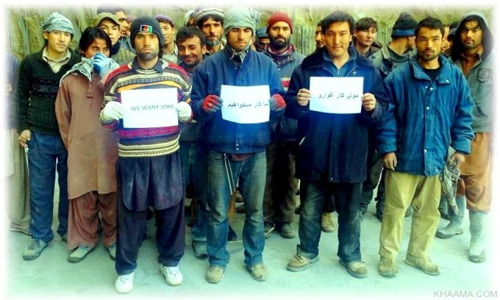It is said that unemployment is the second most destructive problem in Afghanistan after insecurity. Though there is no accurate report about unemployment rate in the country, most report and ground facts indicates that the number of unemployment is not lower than 60% in the country. for example, if we take a walk to the crowded parts of Kabul city such as Quta Sangi, Pool-e Sorkh, Sinoyee Pamir, a large number of laborers are gathered there and desperately waiting to get a temporary job which would earn him barely one up to three dollar a day. As employers approach the laborers, the awaiting workers race for being picked for the work while the rest may return home without any earnings. Despite the historic opportunities in last 18 years, most of Afghans still find it hard to get employed and make a living while the unemployment rate is increasing and the country is still one of the poorest in the world. With 70% of its population below the age of 25, what can Afghanistan do with its unemployment problem?
Unemployment is a status in an economy where people are willing and able to work, and seeking for occupation, but they fail to find jobs. Unemployment impacts national Gross Domestic Product (GDP) and has a negative effect on psychological and social lives of people. Unemployment can pave the ground for terrorists and mafia groups to easily hire jobless youths and continue their destructive activities. unemployment can increase insecurity, social crimes and overall enlarge the distance between people and government. In last presidential election, less than 2 million people participated while there are more than 35 million populations in the country.
Scientifically, it has been proved that unemployment has severe negative psychological effects on individuals resulting depression, lack of motivation, anger and anxiety. When individuals do not have sufficient income and their psyche is damaged, they are more likely to turn into criminal activities, and thus the crime rate in a society goes up. Employers usually hire people with work experiences, which is another disadvantage for unemployed people. This is commonly known as the hysteresis effect. Unemployment also causes detrimental changes in family relationships, often resulting to divorce and families falling apart. Scientific researches highlight that unemployment increases people’s tendency towards suicide and other acts of self-immolation.
Moreover, Unemployment can inflict a very devastating repercussion in Afghan refugees. A large number of refugees cannot return home and join their families due to the same issues while thousands of Afghans flee the country to neighboring countries such as Iran and Pakistan for making a living. Afghanistan still has more than 3 million refugees in neighboring countries and beyond. So, the insecurity issue is not the only reason for those Afghans who choose the dangerous way seeking asylum over staying at home. After insecurity, unemployment is the second cause for migration of Afghans. Not only unskilled Afghan laborers migrate, but also educated and skilled Afghans, who are in search of employment and better life, migrate abroad with no prospect for returning back home.
Unfortunately, the Afghan universities are not producing job creators they produce job seekers. After the fall of the Taliban in 2001, millions of Afghans rushed into gaining education and received trainings with the hope to get employed and find well-paying jobs. Since then nearly 137 private universities and institutions have been opened in the country and thus nearly 38 public universities are busy in providing higher educational services. Unfortunately, most of the fresh graduates do not have required skills and eligibility to fulfill the technical and professional needs of the local companies. They do not have the creativity to initiate new jobs through opening new entrepreneurs instead of searching to work for others. That is why, in some cases, foreigners are hired both in private and public sectors while according to a report about 400,000 new workforces add to labor market annually, but the economic system is unable to provide jobs for this huge number of people. Many Afghans are gaining education while unaware that when they graduate, they may have to face unemployment. In few past years, there were debates in regard to unemployment reduction but no practical steps have been witnessed yet.
So as to create jobs, we have to plan and implement extensive and dedicated programs. The government needs to support private sector and encourage businesses investing in agriculture and mining sectors. Afghanistan is an agrarian country, and has huge untapped mining reserves. The government can provide facilitations to firms and businesses investing in agricultural businesses such as raising livestock, producing, processing and preserving food products as well as in mining sector. The government can promote private sector through supporting national or international small and medium enterprises and companies by easing various types of taxes and duties, providing loans, security and the critical infrastructural services. If the international firms are encouraged enough to invest in Afghanistan, and if they are ensured on low risk and good profits, the government would have achieved a huge leap in boosting employment in the country.
We can also look for foreign labor markets that are thirsty for energetic labor force. There are many nations in the region who earn billions by sending their workers to other countries through mutual state protocol. For instance, India annually makes 86 billion dollars, Indonesia 46 million dollar and Philippine 12 milliard dollar through sending laborers to foreign countries. But due to lack of such agreement, millions of Afghan workers are suffering from working in illegal labor markets. Sometimes they are not paid while cannot raise their voice due to lack of that formal contract. As Afghans are hardworking and reliable, they can be easily attracted if our government seriously looks for such market.
Home » Opinion » The cause and consequences of unemployment in Afghanistan
The cause and consequences of unemployment in Afghanistan
| Mohammad Zahir Akbari

